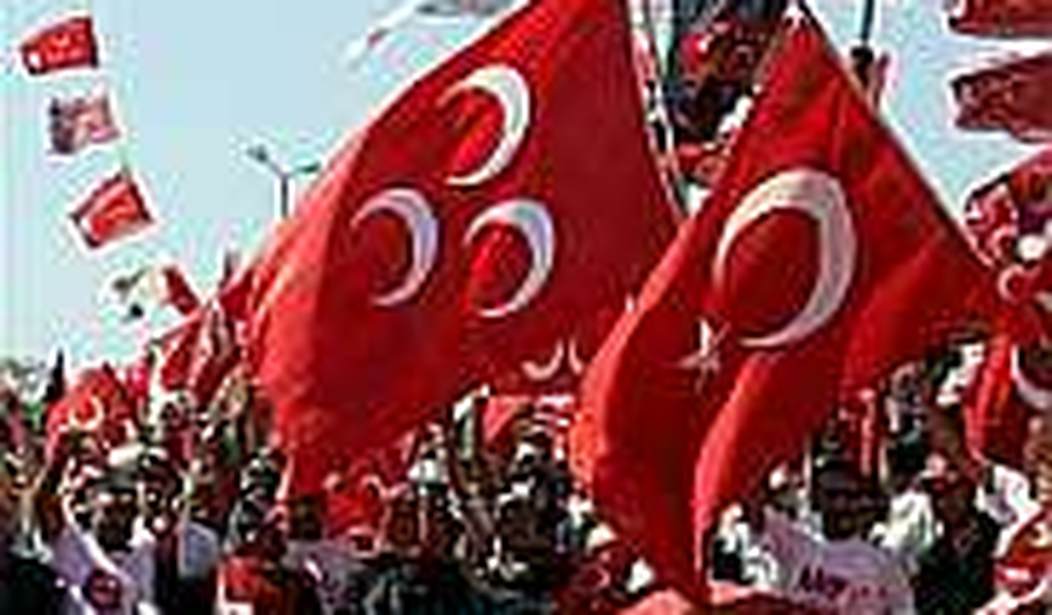ISTANBUL – Traveling to Tel Aviv’s airport en route to Istanbul to cover the parliamentary elections, the taxi driver listened to the conversation and mentioned he was born in Turkey, spoke Turkish, still had relatives there, and followed events closely.
Then he added, “The way things are going Turkey might end up like Iran.”
That’s an exaggeration but it does state the central issue: Is the domination by the Islamic-oriented (but not overtly Islamist) AKP party going to lead Turkey into something like a radical, anti-secular state?
The AKP has now won still another election and this new mandate is going to allow it probably to name Turkey’s next president, next military commander, and many judges, as well as moving the educational system in an Islamic direction.
For one thing, the AKP, which earlier gained about 30 percent of voters support, is now at just under 50 percent. Ironically, the party got a lot more voters but will get fewer seats since both the socialist and nationalist parties qualified, whereas only the former got into parliament last time. A lot of voters backed AKP because they see it as either a conservative party or a relatively honest one. Turks don’t want an Islamist state. Still, they have given AKP a mandate.
To understand better what is going on, let me tell you about my former student and friend who I will call Mehmet. When I was teaching at Middle East Technical University in Ankara, Mehmet was the leader of the Islamic student union. One day I wasn’t feeling well. “Take good care of yourself,” Mehmet joked. “If anything happens to you they’ll blame me.”
After graduating he went to work for one of the top AKP leaders. One day he asked if he could visit me in Israel. When he visited, he had a wonderful time, fascinated with the Israeli system of a state that combined secularism and religious tradition in a unique way. Before he left, Mehmet told me that his goal was to make Turkey like Israel.
I doubt whether many AKP leaders would put it that way. In fact, a professor friend of mine-who calls herself a secularist feminist following the ideology of Kemal Ataturk, founder of the Turkish republic-said of Mehmet jokingly, “When the Islamists take over he’ll be one of the first ones they shoot.” But it does reveal the fact that Turkey has three choices.
The first choice is a militantly secular state, closer to the French tradition, going far beyond the American separation of church and state. This tradition, which has dominated Turkey for the last 75 years, looks pretty much on the ropes. More and more women even in Istanbul wear the symbolic head scarf. One can hear the Islamic greeting “salaam alaykum” as well as the traditional Turkish “marhaba.”
The second possibility-and this is what the AKP says it wants–is a state that honors Turkey’s Islamic traditions and gives the religion of the great majority a presence and place of honor in public life. So, for example, Islamic schools are elevated in prestige and as an alternative to secular schools. Alcohol is not sold in Istanbul’s parks. Women wearing headscarves can be television news presenters, members of parliament, and students sitting in university classrooms.
This presumes that the pendulum can be set to swing so far and then remain in balance. Even Ataturk, a militant secularist who believed Islam’s public power was one of the greatest threats to Turkey making social progress, once said, “Our religion is the most reasonable and natural religion.”
The third outcome, however, would be to make “Islamic” behavior normative. This might mean, for instance, that women not wearing headscarves could not sit in classrooms. That’s the Iranian model.
It is hard to believe that Turkey would go that far. Yet things still might go much further than most Turks prefer. Already, for example, it is clear that the Turkish media is becoming intimidated, afraid to criticize the incumbent government lest it suffer material sanctions or even physical violence. The army is watching and might intervene one day if it feels secularism is fundamentally endangered. But what if career-minded officers decide that cultivating the AKP is the best way to get to the top? That last bulwark could also crumble.
What is absolutely clear is that the existing parties have failed to respond successfully to the AKP challenge or to mobilize the fears and dismay of the country’s majority. “The voice of the people,” Ataturk once said, “is the voice of the righteous.” But this election, perhaps more than any other event in Turkey since he died almost 70 years ago, should send him spinning in his grave.
AKP can be more confident, which means more aggressive in pushing its program to “Islamify” and possibly to “Islamize” Turkey. This is not a good thing for the West.
How bad it will be is going to depend on whether the AKP is constrained by fear of the army and the fact that it lacks a two-thirds’ majority needed to push some things through parliament. Still, the election’s result is that the party no longer has to worry about the opposition parties unseating it.
Barry Rubin is Director of the Global Research in International Affairs Center(GLORIA) Center, at the Interdisciplinary Center (IDC) in Herzilia, Israel. His latest book is %%AMAZON=1403982732 The Truth About Syria%%









Join the conversation as a VIP Member